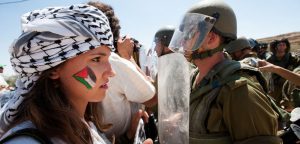West Bank © Ryan Rodrick Beiler
Palestinians have asked for decades “Whose house is this?” Trump has given the green light for the occupation to take whatever of the “house” is left.
By Hasheemah Afaneh / 12.30.2017
“Whose house is this?” A man in a black sweater and dark jeans stood at the podium, raised both arms in the air and asked the question again. He spoke of Community Benefits Agreements in the city of New Orleans, Louisiana, whilst reiterating the rhetorical-in-nature question, “Whose house is this?” to the city council members. New Orleans, the man informed the council members, was his city, and he had as much of a say in it as did the policymakers before him.
It was my first time in the City Council Chambers of New Orleans. I was sitting on teal-colored seats, which seemed to have been worn out over the past decade or so, alongside members from and supporters of the New Orleans Palestinian Solidarity Committee (NOPSC). On December 6, US President Donald Trump recognized Jerusalem as Israel’s capital, sparking outrage among the Palestinian communities in Palestineand abroad, including in the city of New Orleans.
To Palestinians, Trump’s decision confirms the fact that Washington was never a just deal-broker between Palestine and Israel, the failure of the international community to hold certain powers accountable, and the disappointment (yet again) in the Arab as well as the Palestinian leadership. It also reaffirms that the 1993 Oslo Accords, and the “peace process” that was presumed to come with it, can never be resurrected, as Palestinians never held a seat at the negotiating table to begin with.
On December 12, six days after Trump’s recognition, the NOPSC called on a press conference outside of New Orleans City Hall not only to condemn the president’s announcement, but also to present a Human Rights Ordinance to the city council members. The three-page ordinance, titled “Resolution Calling for City-Wide Divestment from Companies that Profit from Human Rights Abuses and War Crimes,” requests the city of New Orleans to present social concerns and values, such as environmental, health, and human rights concerns, as “principles for consideration in the city’s direct investment in corporate securities and in the companies with whom the city contracts.” The NOPSC had presented such a request earlier in the year, but as Mayor-elect LaToya Cantrell’s chief of staff admits, not as much follow-up ensued as should have.
In mid-2016, the NOPSC drafted a letter to the city’s council members, demanding that the city “say no” to Israeli products, such as those from Sabra Dipping Company, which contribute financially to the Israeli occupation that violates human rights on a daily basis. Palestinians know too well the hypocrisy lying between the lines when talks about the poor education, housing, health care and prison systems due to budget cuts and lack of funds in America emerge, as billions of US dollars are poured into aid for the Israeli military and the sustainability of a military occupation that imprisons, abuses, murders and denies basic human rights to an entire people. The NOPSC hopes that the ordinance presented to city council members will initiate the start of a Boycott, Divestment and Sanctions (BDS) campaign in New Orleans.
On our way inside City Hall, a woman who was there to speak about fair housing from the Louisiana Socialist Network asked if we were also there to speak.
“Well, if it’s not related to the issues the committee hearing is covering today, just phrase the beginning in a way that is and then dive into your topic,” she advised us.
Tabitha Mustafa, an NOPSC organizer, stood at the podium. As she was explaining why the NOPSC was there and what the ordinance included, a council member interrupted her, saying that if what she was about to say isn’t related to the topic of discussion, the council would have to hear it at another committee hearing.
Mustafa assured him it was related.
It is related. What the council member, and many of our co-workers, colleagues, friends and neighbors, may not understand is that for many Palestinians in the diaspora, our — the Palestinian — struggle for basic human rights is related to all that we do, say and learn wherever we tend to be. It is related to all the struggles for justice around the world, including those in communities, such as Flint, Michigan and Standing Rock.
Palestinians have asked for decades now “Whose house is this?” The announcement by President Trump only leaves the green light on for the occupation to take whatever of the “house” is left.
Originally published by Fair Observer and republished here with permission .


